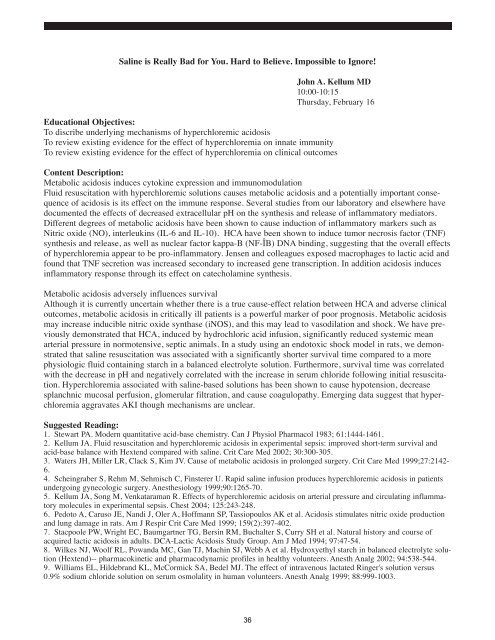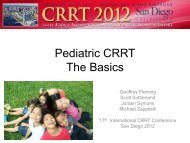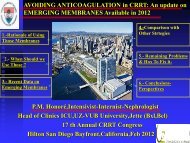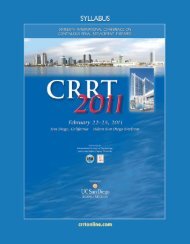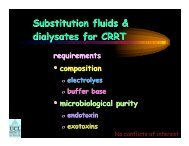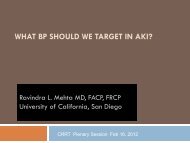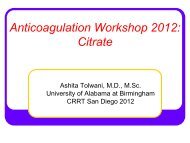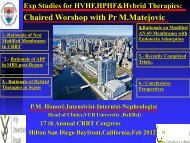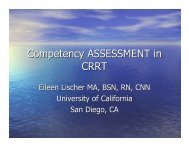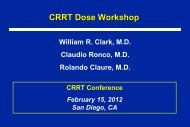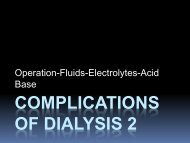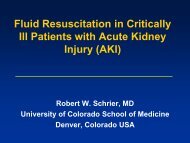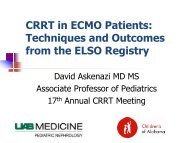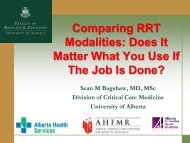ABSTRACTS from 16th International COnference on ... - CRRT Online
ABSTRACTS from 16th International COnference on ... - CRRT Online
ABSTRACTS from 16th International COnference on ... - CRRT Online
Create successful ePaper yourself
Turn your PDF publications into a flip-book with our unique Google optimized e-Paper software.
Saline is Really Bad for You. Hard to Believe. Impossible to Ignore!<br />
John A. Kellum MD<br />
10:00-10:15<br />
Thursday, February 16<br />
Educati<strong>on</strong>al Objectives:<br />
To discribe underlying mechanisms of hyperchloremic acidosis<br />
To review existing evidence for the effect of hyperchloremia <strong>on</strong> innate immunity<br />
To review existing evidence for the effect of hyperchloremia <strong>on</strong> clinical outcomes<br />
C<strong>on</strong>tent Descripti<strong>on</strong>:<br />
Metabolic acidosis induces cytokine expressi<strong>on</strong> and immunomodulati<strong>on</strong><br />
Fluid resuscitati<strong>on</strong> with hyperchloremic soluti<strong>on</strong>s causes metabolic acidosis and a potentially important c<strong>on</strong>sequence<br />
of acidosis is its effect <strong>on</strong> the immune resp<strong>on</strong>se. Several studies <str<strong>on</strong>g>from</str<strong>on</strong>g> our laboratory and elsewhere have<br />
documented the effects of decreased extracellular pH <strong>on</strong> the synthesis and release of inflammatory mediators.<br />
Different degrees of metabolic acidosis have been shown to cause inducti<strong>on</strong> of inflammatory markers such as<br />
Nitric oxide (NO), interleukins (IL-6 and IL-10). HCA have been shown to induce tumor necrosis factor (TNF)<br />
synthesis and release, as well as nuclear factor kappa-B (NF-ÎB) DNA binding, suggesting that the overall effects<br />
of hyperchloremia appear to be pro-inflammatory. Jensen and colleagues exposed macrophages to lactic acid and<br />
found that TNF secreti<strong>on</strong> was increased sec<strong>on</strong>dary to increased gene transcripti<strong>on</strong>. In additi<strong>on</strong> acidosis induces<br />
inflammatory resp<strong>on</strong>se through its effect <strong>on</strong> catecholamine synthesis.<br />
Metabolic acidosis adversely influences survival<br />
Although it is currently uncertain whether there is a true cause-effect relati<strong>on</strong> between HCA and adverse clinical<br />
outcomes, metabolic acidosis in critically ill patients is a powerful marker of poor prognosis. Metabolic acidosis<br />
may increase inducible nitric oxide synthase (iNOS), and this may lead to vasodilati<strong>on</strong> and shock. We have previously<br />
dem<strong>on</strong>strated that HCA, induced by hydrochloric acid infusi<strong>on</strong>, significantly reduced systemic mean<br />
arterial pressure in normotensive, septic animals. In a study using an endotoxic shock model in rats, we dem<strong>on</strong>strated<br />
that saline resuscitati<strong>on</strong> was associated with a significantly shorter survival time compared to a more<br />
physiologic fluid c<strong>on</strong>taining starch in a balanced electrolyte soluti<strong>on</strong>. Furthermore, survival time was correlated<br />
with the decrease in pH and negatively correlated with the increase in serum chloride following initial resuscitati<strong>on</strong>.<br />
Hyperchloremia associated with saline-based soluti<strong>on</strong>s has been shown to cause hypotensi<strong>on</strong>, decrease<br />
splanchnic mucosal perfusi<strong>on</strong>, glomerular filtrati<strong>on</strong>, and cause coagulopathy. Emerging data suggest that hyperchloremia<br />
aggravates AKI though mechanisms are unclear.<br />
Suggested Reading:<br />
1. Stewart PA. Modern quantitative acid-base chemistry. Can J Physiol Pharmacol 1983; 61:1444-1461.<br />
2. Kellum JA. Fluid resuscitati<strong>on</strong> and hyperchloremic acidosis in experimental sepsis: improved short-term survival and<br />
acid-base balance with Hextend compared with saline. Crit Care Med 2002; 30:300-305.<br />
3. Waters JH, Miller LR, Clack S, Kim JV. Cause of metabolic acidosis in prol<strong>on</strong>ged surgery. Crit Care Med 1999;27:2142-<br />
6.<br />
4. Scheingraber S, Rehm M, Sehmisch C, Finsterer U. Rapid saline infusi<strong>on</strong> produces hyperchloremic acidosis in patients<br />
undergoing gynecologic surgery. Anesthesiology 1999;90:1265-70.<br />
5. Kellum JA, S<strong>on</strong>g M, Venkataraman R. Effects of hyperchloremic acidosis <strong>on</strong> arterial pressure and circulating inflammatory<br />
molecules in experimental sepsis. Chest 2004; 125:243-248.<br />
6. Pedoto A, Caruso JE, Nandi J, Oler A, Hoffmann SP, Tassiopoulos AK et al. Acidosis stimulates nitric oxide producti<strong>on</strong><br />
and lung damage in rats. Am J Respir Crit Care Med 1999; 159(2):397-402.<br />
7. Stacpoole PW, Wright EC, Baumgartner TG, Bersin RM, Buchalter S, Curry SH et al. Natural history and course of<br />
acquired lactic acidosis in adults. DCA-Lactic Acidosis Study Group. Am J Med 1994; 97:47-54.<br />
8. Wilkes NJ, Woolf RL, Powanda MC, Gan TJ, Machin SJ, Webb A et al. Hydroxyethyl starch in balanced electrolyte soluti<strong>on</strong><br />
(Hextend)-- pharmacokinetic and pharmacodynamic profiles in healthy volunteers. Anesth Analg 2002; 94:538-544.<br />
9. Williams EL, Hildebrand KL, McCormick SA, Bedel MJ. The effect of intravenous lactated Ringer's soluti<strong>on</strong> versus<br />
0.9% sodium chloride soluti<strong>on</strong> <strong>on</strong> serum osmolality in human volunteers. Anesth Analg 1999; 88:999-1003.<br />
36


